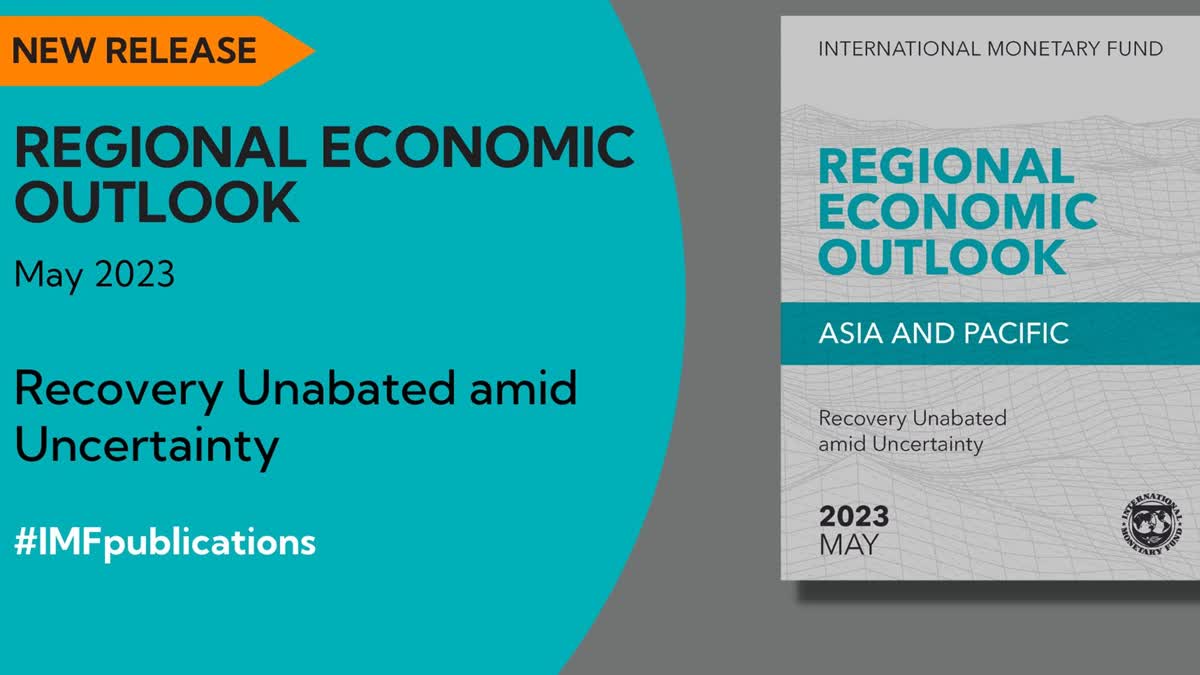Hyderabad: The International Monetary Fund (IMF) has projected the growth in Asia-Pacific region at IMF 4.6% for the year 2023, up from last year's 3.8% saying that the growth in the region will be driven primarily by India and China. In its latest 35-page Regional Economic Outlook for Asia and Pacific titled 'Recovery Unabated amid Uncertainty', the IMF has said that Asia’s dynamism will be driven primarily by the “recovery in China and resilient growth in India”, while growth in the rest of Asia is expected to bottom out in 2023, in line with other regions.
-
Following a challenging year for the world economy, Asia & the Pacific remains a dynamic region. Growth is projected to increase this year to 4.6%, up from 3.8% in 2022. The biggest driver of Asia’s growth this year is China. Our latest report: https://t.co/L5g1VZc0Ti pic.twitter.com/eMgfcBsdDz
— IMF (@IMFNews) May 2, 2023 " class="align-text-top noRightClick twitterSection" data="
">Following a challenging year for the world economy, Asia & the Pacific remains a dynamic region. Growth is projected to increase this year to 4.6%, up from 3.8% in 2022. The biggest driver of Asia’s growth this year is China. Our latest report: https://t.co/L5g1VZc0Ti pic.twitter.com/eMgfcBsdDz
— IMF (@IMFNews) May 2, 2023Following a challenging year for the world economy, Asia & the Pacific remains a dynamic region. Growth is projected to increase this year to 4.6%, up from 3.8% in 2022. The biggest driver of Asia’s growth this year is China. Our latest report: https://t.co/L5g1VZc0Ti pic.twitter.com/eMgfcBsdDz
— IMF (@IMFNews) May 2, 2023
The report said that growth in Asia and the Pacific is projected to increase this year to 4.6%, from 3.8% in 2022, an upgrade of 0.3% relative to the October 2022 World Economic Outlook. This means the region would contribute around 70% of global growth, the IMF said. As per the IMF report, Asia and Pacific will be the “most dynamic of the world’s major regions in 2023, predominantly driven by the buoyant outlook for China and India”.
Also read: IMF lowers India's growth projection to 5.9 pc for current fiscal
The two largest emerging market economies of the region are expected to contribute around half of global growth this year, it said. In China, the economy is expected to expand by 5.2 percent in 2023, as the rapid economic reopening generates a strong recovery in private consumption, the IMF report said. Back home in India, the IMF said that growth momentum will begin to slow as softening domestic demand offsets strong external services demand; growth is expected to moderate slightly from 6.8 percent in 2022 to 5.9 percent this year.
-
Asia will contribute 67% of global growth this year—much more than in recent years—boosted by China’s reopening economy. See our Chart of the Week blog for more on the outlook: https://t.co/cgun0ydcqz pic.twitter.com/62OsYOT0qc
— IMF (@IMFNews) May 2, 2023 " class="align-text-top noRightClick twitterSection" data="
">Asia will contribute 67% of global growth this year—much more than in recent years—boosted by China’s reopening economy. See our Chart of the Week blog for more on the outlook: https://t.co/cgun0ydcqz pic.twitter.com/62OsYOT0qc
— IMF (@IMFNews) May 2, 2023Asia will contribute 67% of global growth this year—much more than in recent years—boosted by China’s reopening economy. See our Chart of the Week blog for more on the outlook: https://t.co/cgun0ydcqz pic.twitter.com/62OsYOT0qc
— IMF (@IMFNews) May 2, 2023
Economies belonging to the Association of Southeast Asian Nations are also expected to see growth decreasing from 5.7 percent in 2022 to 4.6 percent in 2023, due to a slight moderation in domestic demand momentum (Malaysia, Thailand), monetary tightening (Philippines), commodity prices easing (Indonesia, Malaysia), and weaker external demand from the United States and Europe, the IMF report said.
In Bangladesh, growth will slow to 5.5 percent in 2023 because of demand management measures; the recently approved Extended Fund Facility will help address economic challenges caused by Russia’s war in Ukraine, while the concurrent Resilience and Sustainability Facility arrangement will help expand fiscal space to finance climate investment priorities and build resilience against long-term climate risks, it said.
In Sri Lanka, the recently approved Extended Fund Facility Arrangement will provide much needed financing and help stabilize the economy, added the IMF report. The IMF has projected that 2023 looks to be a challenging year for the global economy, with global growth decelerating as the effects of monetary tightening and Russia’s war in Ukraine continue to weigh on activity.
-
Asia’s economic growth is poised to accelerate to 4.6% this year from 3.8% last year with India and a reopened China driving the jump. Our Chart of the Week has the global context: https://t.co/cgun0ydcqz pic.twitter.com/J2L2Skm6gN
— IMF (@IMFNews) May 2, 2023 " class="align-text-top noRightClick twitterSection" data="
">Asia’s economic growth is poised to accelerate to 4.6% this year from 3.8% last year with India and a reopened China driving the jump. Our Chart of the Week has the global context: https://t.co/cgun0ydcqz pic.twitter.com/J2L2Skm6gN
— IMF (@IMFNews) May 2, 2023Asia’s economic growth is poised to accelerate to 4.6% this year from 3.8% last year with India and a reopened China driving the jump. Our Chart of the Week has the global context: https://t.co/cgun0ydcqz pic.twitter.com/J2L2Skm6gN
— IMF (@IMFNews) May 2, 2023
“Persistent inflationary pressures, and recent financial sector problems in the United States and Europe, are injecting additional uncertainty into an already complex economic landscape,” it said.



